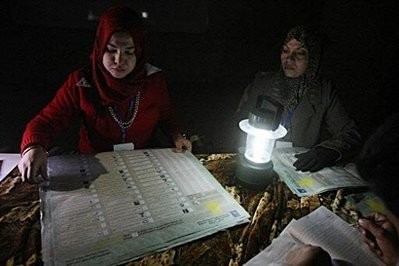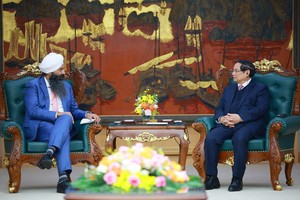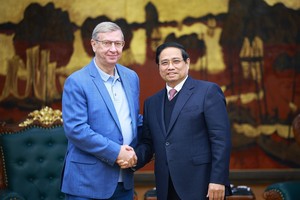Iraq's general election saw a strong turnout of at least 50 percent in most areas, initial forecasts showed Monday after a ballot hit by rocket, mortar and bomb attacks that killed 38 people.
Millions voted in the poll, winning international praise for their courage and determination in a crunch test of the war-shattered nation's young democracy less than six months before American combat troops quit the country.
US President Barack Obama paid tribute to all those who cast ballots in the nationwide poll on Sunday, the second parliamentary election since US-led forces ousted dictator Saddam Hussein in 2003.
"I have great respect for the millions of Iraqis who refused to be deterred by acts of violence, and who exercised their right to vote," Obama said in his first reaction to the ballot. Related article: Iraqis vote 'without fear'

His comments came at the end of voting on a warm spring day that saw long queues at polling stations in Baghdad, in Sunni towns that mostly boycotted the 2005 parliamentary vote, and elsewhere across the country.
The Independent High Electoral Commission (IHEC) said in preliminary estimates that voter turnout was 50 percent or more in all but one of the 16 provinces it was able to provide figures for.
Turnout was strongest, 76 percent, in Arbil, capital of Iraq's autonomous northern Kurdish region, and in the disputed province of Kirkuk, 70 percent, which is at the centre of a battle for control between Arabs and Kurds. Related article: Kurds vote timidly for change
The Sunni stronghold provinces of Nineveh -- 65 percent -- and Anbar -- 64 percent -- were not far behind, according to data compiled late Sunday, IHEC officials told AFP.
Full election results are not expected until March 18, and after that it will likely take months of horsetrading before a new government is formed as no single political bloc is set to emerge dominant from the vote.
The United Nations praised voters and election organisers, while urging caution about premature predictions of the outcome.
"This day has been a triumph of reason over confrontation and violence," Ad Melkert, the UN's envoy to Iraq told reporters in Baghdad on Sunday.
"The polling process was well-organised, orderly... and polling procedures were properly applied," he said after visiting voting centres in the Iraqi capital and the northern city of Kirkuk.
Baghdad bore the brunt of Sunday's violence, with around 70 mortars raining down on mostly Sunni areas.
The cities of Fallujah, Baquba, Samarra and several other areas were also hit by mortar rounds or bombs, many of them exploding near polling stations.
Twenty-five of the dead perished when a rocket flattened a residential building in the north of the capital, and all the other deaths were in or near the city.
A total of 110 people were wounded in the attacks, which came despite the 200,000 police and soldiers deployed in Baghdad and hundreds of thousands more across the country.
An Al-Qaeda group, which sees the election as validating the Shiite-led government and the US occupation, warned Friday that anyone voting ran the risk of being attacked, heightening an already tense security situation.
Prime Minister Nuri al-Maliki said the attacks "are only noise to impress voters but Iraqis are a people who love challenges and you will see that this will not damage their morale."
Sunni Arabs boycotted nationwide polls in 2005 in protest at the rise to power of the nation's long-oppressed Shiite majority. Factfile: Iraq
That boycott deepened the sectarian divide and heightened unrest that killed tens of thousands of Iraqis in the aftermath of the 2003 invasion and which has only eased in the past two years. Related article: Key dates since US-lead invasion
Washington hopes the election will bolster Iraq's democracy, making it a beacon in a region where free and fair elections are the exception, and pave the way to a smooth pullout of American troops.
Maliki, the Shiite head of the State of Law Alliance, is bidding to become the first Iraqi voted back into office at the will of the people who for decades had no choice but Saddam's Baath Party.
His opponents include Iyad Allawi, a Shiite former prime minister who heads the Iraqiya list, a rival secular coalition that has strong support in Sunni areas, who on Sunday criticised the conduct of election organisers.
"I demand a wide investigation from the new parliament and all senior members of the IHEC should be made accountable," said Allawi.
























